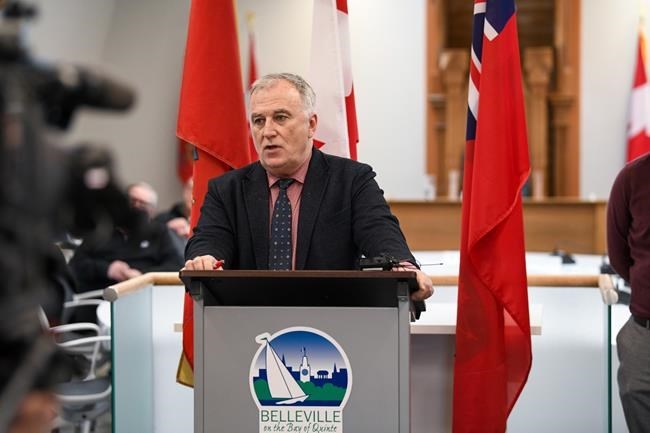The mayor of Belleville, Ont., says the city needs to be part of a "larger plan" to deal with an ongoing addictions and mental-health crisis after emergency crews responded to 17 overdoses in 24 hours.
City officials said 14 of those overdoses occurred within a two-hour span Tuesday afternoon, prompting police to issue an advisory urging residents to stay away from the downtown core during the rash of emergency calls.
Police in the southeastern Ontario community of about 55,000 residents said Wednesday that no one died from those overdoses and there was never a threat to the public. Authorities could not confirm the type of drugs responsible for the 17 overdoses.
But Mayor Neil Ellis said that, like many other municipalities across the province and the country, Belleville is in a "serious" drug, addictions and mental-health crisis.
“It’s not the first occurrence and it won’t be the last," Ellis said in a statement after joining police, fire, paramedic and public health officials to discuss the recent overdoses at a news conference Wednesday.
"We need support from the provincial government on how we move forward with this crisis. It is a crisis that is not specific to Belleville, it is a provincial and federal issue," he said. "We need to be part of a larger plan, focusing on harm reduction and rehabilitation. As a municipality, we are ready to help and do whatever we can to be part of the solution, but we need some guidance.”
A spokesperson for Ontario Health Minister Sylvia Jones said the province's most recent budget includes a five-per-cent increase in base funding for community-based mental-health and addiction organizations, which includes nearly $35 million for Belleville.
The spokesperson also said in an email statement to The Canadian Press that the province has invested $525 million in various addiction treatment services and supports since 2019, which includes nearly $2 million for mobile crisis rapid response in Belleville.
Dr. Ethan Toumishey, medical officer of health and CEO of Hastings Prince Edward Public Health – which serves Belleville and other municipalities in the region – said Tuesday's overdose emergency is part of a larger trend in the area and across the province.
"This was a very concentrated number of these tragic events in a short period of time," he said in a phone interview. "But when we look at the overall picture ... overdoses from a contaminated unregulated drug supply have been increasing in the community for a significant length of time now."
"I think by and large, the factors that would be going into this are the same that we see across the province and across other jurisdictions in North America," he added.
Toumishey said smaller municipalities like those in Hastings and Prince Edward counties have fewer resources and community partnerships to address addictions and overdoses than large cities. For example, there may be fewer people who are able to administer Naloxone to reverse an overdose and fewer rapid access clinics for people seeking help to manage their addiction, he said.
Belleville Police Chief Mike Callaghan said in a statement police will be working with other emergency and public health services to develop operational scenarios for multiple overdose situations in the future.
Officials say people who use drugs should protect themselves by avoiding mixing drugs, trying small amounts first, not using alone and having multiple Naloxone kits on hand.
Anyone who suspects or witnesses an overdose is asked to call 911 immediately.
Toumishey said the Belleville region is working toward long-term solutions to the crisis, but it will require help from all levels of government to expand substance use services and support.
"When we think about who is being affected by this ... it's our family members, it's our community members, our neighbours, co-workers," he said. "This really is affecting the entire community and compassion is really fundamental as we embark on that long-term work."
This report by The Canadian Press was first published Feb. 7, 2024.
Sonja Puzic, The Canadian Press

